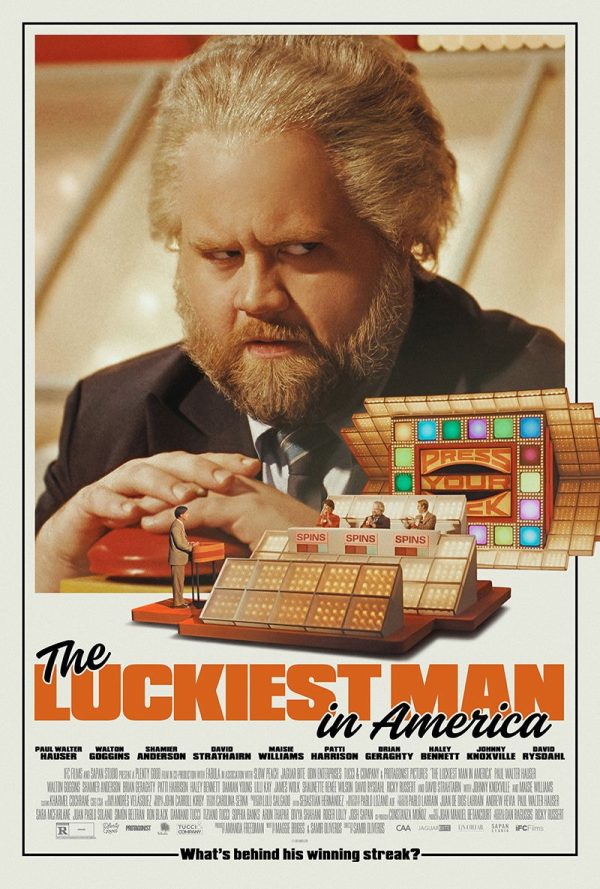The Luckiest Man in America, 2025.
Directed by Samir Oliveros.
Starring Paul Walter Hauser, Walton Goggins, Shamier Anderson, David Strathairn, Maisie Williams, Patti Harrison, Brian Geraghty, Haley Bennett, Johnny Knoxville, David Rysdahl, Shaunette Renée Wilson, Ricky Russert, Lilli Kay, and James Wolk.
SYNOPSIS:
May 1984. An unemployed ice cream truck driver steps onto the game show Press Your Luck harboring a secret: the key to endless money. But his winning streak is threatened when the bewildered executives uncover his real motivations.
Co-writer/director Samir Oliveros (working alongside screenwriter Maggie Briggs) is only interested in half (maybe even less) of the story The Luckiest Man in America has to tell. Led by a great Paul Walter Hauser as high-anxiety, socially stunted Press Your Luck contestant Michael Larson (it’s another role that plays to his oddball strength) and centered on the 1984 episode of that game show where his showing started dire until dramatically turning things around, banking more money than anyone had ever won, leading ABC’s crew (played by David Strathairn and Shamier Anderson, among others in the puzzled control room) confounded and scrambling to figure out the secret to his consistent success within mechanics that are built on dumb luck with a charismatic host (Walton Goggins) typically cautioning them to play it safe.
The rules are simple: a first round comprised of general trivia questions (something Paul Walter Hauser is familiar with, having been an entertaining celebrity presence on the now-defunct YouTube show Movie Trivia Schmoedown) that determines how many spins a player gets in the following two rounds occurs. Those spins are for a board of about seven horizontal and vertical rows with rewards that rapidly and seemingly randomly change, with one of them being a devilish mascot that bankrupts the player. The goal is to press the button and hope one of the many different sums of money on the board is selected. And preferably ones that come with bonus spins.
Michael, the financially destitute dimwit driving an ice cream truck who immediately alienated those show runners until they felt pity on him while unable to get that vehicle to start and leave the parking lot, lands on cash every time he pushes the button. It could be genuine luck. It could also be cheating. Either way, the ABC crew isn’t happy about the winnings and launches an investigation during the episode (which is running so long that one isn’t enough) that uncovers a history of Ponzi schemes, restraining orders, and estrangement from his wife and daughter (Michael claims it’s her birthday). It’s undeniably intriguing, except the filmmakers don’t care about any of it. They treat these revelations halfheartedly, as if merely mentioning them was an obligation rather than an opportunity to dive further into this idiosyncratic person.
That means the only mode The Luckiest Man in America works (aside from a reliably solid ensemble, finely crafted period-piece details, and the uncanny resemblance of Paul Walter Hauser to the actual Michael Larson) is if one has no connection to this true story and hasn’t been spoiled on whether or not he walks away with any money. This makes it compelling for unfamiliar people and allows the film to unfold like a real-time thriller. For everyone else, this is a retelling of what happened that offers practically no insight.
The dramatization goes overboard and defies the logic of taping television, with Michael wandering around the studio between breaks, at one point winding up on a separate show entirely with a host played by Johnny Knoxville. It’s seemingly meant to instill a revelation regarding what Michael is doing and what’s important to him, but the whole segment comes across as phony, drifting far off from reality. If this did happen, and I sound like an idiot, it’s still interrupting the flow and pacing of the riveting game show element.
Accounting for the “don’t blow it and lose the money” tension and the several hints at a checkered past, The Luckiest Man in America sets itself up to tie everything together with surprises and complexity. Instead, it ends on an anticlimactic note as one final reminder that the filmmakers don’t care about these outside circumstances and thorny personal elements. It’s as if they see this story as about a guy who won a boatload of money and nothing more. Unlucky viewers deserve more.
Flickering Myth Rating – Film: ★ ★ / Movie: ★ ★ ★
Robert Kojder is a member of the Chicago Film Critics Association, Critics Choice Association, and Online Film Critics Society. He is also the Flickering Myth Reviews Editor. Check here for new reviews and follow my BlueSky or Letterboxd














